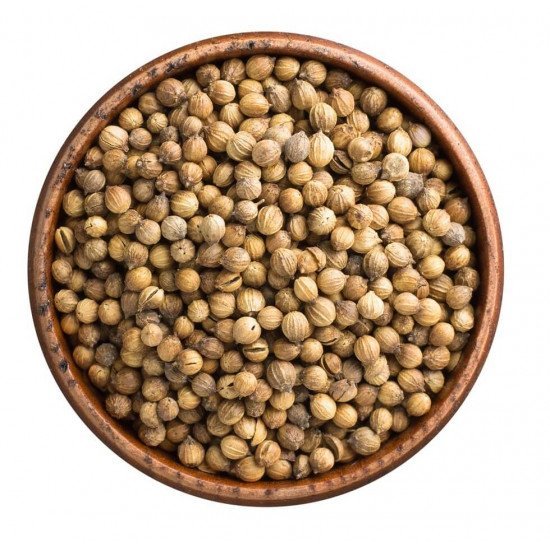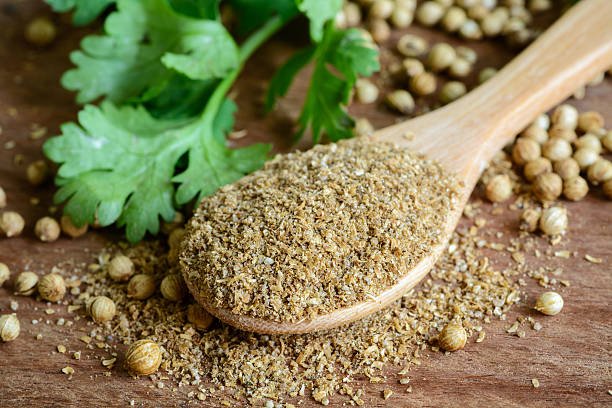Coriander Seeds :
Coriander seeds are the dried fruits of the coriander plant. They are small, round, and light brown in color, with a slightly ridged surface. When crushed, they release a warm, citrusy, and spicy aroma. The flavor of coriander seeds is mild yet distinctive, with a hint of citrus and a subtle sweetness.
Coriander seeds are commonly used as a spice in a wide range of dishes, including curries, stews, and soups. They are also an essential ingredient in spice blends like garam masala. In addition to their culinary uses, coriander seeds have been utilized in traditional medicine for their digestive and anti-inflammatory properties.
Physical Characteristics :
Size and Shape: Coriander seeds are small, round, and slightly oval, measuring about 3-5 mm in diameter. They have a smooth, hard surface and are typically uniform in shape.
Color: The seeds are light brown to yellow-brown in color, with a pale, slightly glossy appearance.
Texture: The seeds have a hard, smooth texture and a slightly ridged surface, which is prominent
Chemical Characteristics:
Essential Oils:
Coriander seeds contain essential oils, with the most notable compounds being linalool (which gives a sweet, floral aroma) and terpinene (which provides a citrusy, slightly spicy fragrance).
Fatty Acids:
The seeds contain fatty acids, such as linoleic acid and oleic acid, which contribute to their nutritional profile.
Flavonoids:
Coriander seeds are rich in flavonoids like quercetin and kaempferol, which have antioxidant properties.
Vitamins and Minerals:
Coriander seeds contain small amounts of vitamins such as vitamin C, vitamin A, and folate, as well as minerals like calcium, iron, and magnesium.
Phytochemicals:
The seeds are also known to have antioxidant and anti-inflammatory properties due to compounds like phenolic acids and terpenes.
These chemical characteristics make coriander seeds valuable not only for their culinary uses but also for their potential health benefits.
Nutritional Value (per 100 grams)
Calories: 298 kcal
Protein: 12.4 g
Fat: 17.8 g
Saturated Fat: 2.0 g
Unsaturated Fat: 15.8 g
Carbohydrates: 55.0 g
Dietary Fiber: 41.9 g
Sugars: 0.9 g
Vitamins:
Vitamin A: 0 IU
Vitamin C: 21 mg (about 35% of the daily value)
Vitamin K: 0.5 mcg
Folate: 26 mcg
Minerals:
Calcium: 709 mg
Iron: 8.0 mg
Magnesium: 126 mg
Potassium: 1260 mg
Phosphorus: 409 mg
Quality Standards
“Compliant with local and European standards according to food safety regulations.”
1. Purity and Cleanliness:
The seeds should be free from contaminants such as dirt, stones, foreign seeds, and other impurities. The purity level must meet the specified standards for the target market.
2. Moisture Content:
The moisture content should typically be below 10-12% to prevent mold growth, spoilage, and maintain the seed’s quality during storage and transport.
3. Pest and Disease Control:
The seeds must be free from any pests, fungal contamination, and diseases. Exported coriander seeds must comply with phytosanitary regulations to prevent the spread of plant pests and diseases.
4. Physical Appearance:
The seeds should be uniform in size, shape, and color. Any damaged, broken, or discolored seeds should be removed to ensure high quality.
5. Aflatoxin and Mycotoxin Levels:
The seeds should be free from harmful mycotoxins such as aflatoxins. These should be within the internationally accepted safety limits.
6. Packaging and Labeling:
The seeds should be packed in clean, food-grade, moisture-resistant packaging, and labeled with necessary information, including origin, batch number, weight, and certification.
7. Certification:
Compliance with international food safety standards, such as ISO, HACCP, and Global GAP certifications, may be required. Phytosanitary certification and other documentation confirming the seeds’ safety and quality are also essential.
These quality standards ensure that coriander seeds meet the necessary requirements for export, ensuring safety, consistency, and compliance with international regulations.
Microbiological Standards :
Coriander seeds should be free from mycotoxins (such as aflatoxins), and their levels should be within the internationally accepted limits to prevent contamination.
This count measures the total number of aerobic bacteria present, and it should be kept within
Packaging and Storage of Coriander Seeds
Packaging:
As per the customer’s request, polypropylene bags and cartons.”
Storage:
Temperature: Store coriander seeds in a cool, dry environment, typically between 15-20°C (59-68°F), to prevent degradation and preserve the seeds’ flavor and quality.
Humidity: Keep humidity levels below 60% to avoid mold growth and seed deterioration.
Ventilation: Ensure good ventilation in the storage area to prevent moisture buildup and maintain optimal air circulation.
Pest Control: The storage area should be free from pests, rodents, and contaminants. Regular inspection is essential.
Shelf Life Management: Implement a First In, First Out (FIFO) system to ensure that older stock is used first and that the seeds are consumed within their optimal shelf life (usually 1-2 years).
Proper packaging and storage are critical to maintaining the quality, safety, and shelf life of coriander seeds during transportation and storage.
Shelf Life :
Under proper storage conditions—cool, dry, and airtight—coriander seeds typically have a shelf life of 1 to 2 years. However, for optimal flavor and potency, it is recommended to use them within 6 to 12 months. Proper packaging and storage are essential to maintain their quality and prevent degradation.
Traceability and Compliance;
Origin :Egypt
Application:
Coriander seeds are widely used as a spice in various cuisines around the world. They add a warm, citrusy flavor to dishes such as curries, soups, stews, and sauces.
They are a key ingredient in spice blends like garam masala and curry powder.
The seeds can be used whole or ground, depending on the desired flavor intensity.
Coriander seeds are commonly used in pickling recipes, imparting a unique flavor to pickled vegetables and fruits.
Traditionally, coriander seeds have been used in herbal medicine to support digestion, relieve indigestion, and reduce bloating.
They may also have anti-inflammatory and antioxidant properties.
Essential oil extracted from coriander seeds is used in aromatherapy for its calming and soothing properties.
Coriander seed oil is sometimes used in skincare products for its potential anti-inflammatory and antimicrobial benefits.
These versatile uses highlight the importance of coriander seeds both in the kitchen and for various health and wellness applications.
Contact information:





